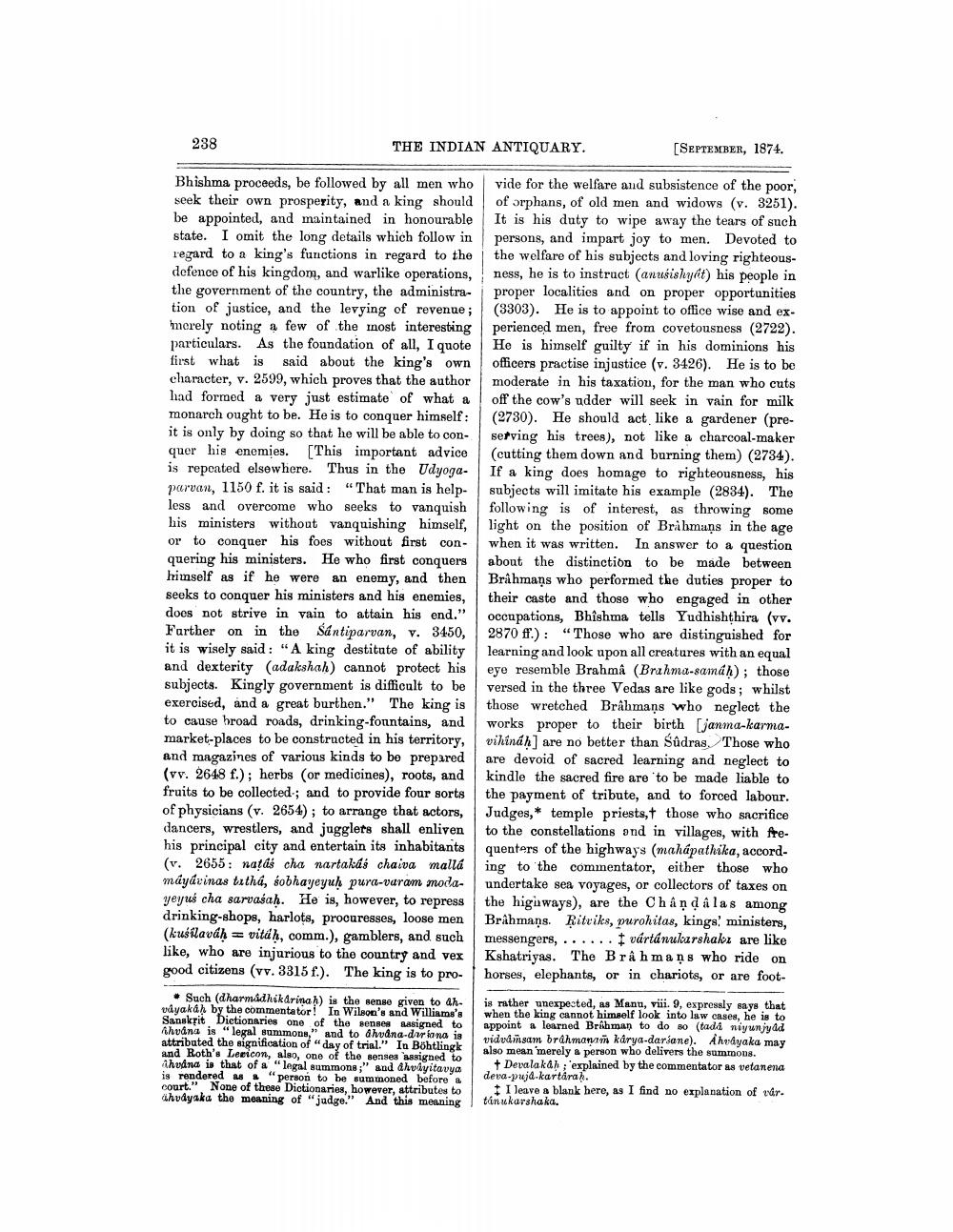________________
238
THE INDIAN ANTIQUARY.
Bhishma proceeds, be followed by all men who seek their own prosperity, and a king should be appointed, and maintained in honourable state. I omit the long details which follow in regard to a king's functions in regard to the defence of his kingdom, and warlike operations, the government of the country, the administration of justice, and the levying of revenue; merely noting a few of the most interesting particulars. As the foundation of all, I quote first what is said about the king's own character, v. 2599, which proves that the author had formed a very just estimate of what a monarch ought to be. He is to conquer himself: it is only by doing so that he will be able to conquer his enemies. [This important advice is repcated elsewhere. Thus in the Udyogaparvan, 1150 f. it is said: "That man is helpless and overcome who seeks to vanquish his ministers without vanquishing himself, or to conquer his foes without first conquering his ministers. He who first conquers himself as if he were an enemy, and then seeks to conquer his ministers and his enemies, does not strive in vain to attain his end." Further on in the Santiparvan, v. 3450, it is wisely said: "A king destitute of ability and dexterity (adakshah) cannot protect his subjects. Kingly government is difficult to be exercised, and a great burthen." The king is to cause broad roads, drinking-fountains, and market-places to be constructed in his territory, and magazines of various kinds to be prepared (vv. 2648 f.); herbs (or medicines), roots, and fruits to be collected; and to provide four sorts of physicians (v. 2654); to arrange that actors, dancers, wrestlers, and jugglers shall enliven his principal city and entertain its inhabitants (v. 2655: natáś cha nartakás chaiva mallá máyávinas titha, sobhayeyuḥ pura-varam modayeyus cha sarvaśaḥ. He is, however, to repress drinking-shops, harlots, procuresses, loose men (kusilaváḥ vitáḥ, comm.), gamblers, and such like, who are injurious to the country and vex good citizens (vv. 3315 f.). The king is to pro
=
Such (dharmadhikarinah) is the sense given to ahvâyakaḥ by the commentator! In Wilson's and Williams's Sanskrit Dictionaries one of the senses assigned to Ahvâna is "legal summons," and to dhodna-duriana is attributed the signification of "day of trial." In Böhtlingk and Roth's Lericon, also, one of the senses assigned to Ahvána is that of a "legal summons;" and dhvayitavya is rendered as a 44 person to be summoned before a court." None of these Dictionaries, however, attributes to ähvdyaka the meaning of "judge." And this meaning
[SEPTEMBER, 1874.
vide for the welfare and subsistence of the poor, of orphans, of old men and widows (v. 3251). It is his duty to wipe away the tears of such persons, and impart joy to men. Devoted to the welfare of his subjects and loving righteousness, he is to instruct (anusishyat) his people in proper localities and on proper opportunities (3303). He is to appoint to office wise and experienced men, free from covetousness (2722). He is himself guilty if in his dominions his officers practise injustice (v. 3426). He is to be moderate in his taxation, for the man who cuts off the cow's udder will seek in vain for milk (2730). He should act like a gardener (preserving his trees), not like a charcoal-maker (cutting them down and burning them) (2734). If a king does homage to righteousness, his subjects will imitate his example (2834). The following is of interest, as throwing some light on the position of Brahmans in the age when it was written. In answer to a question about the distinction to be made between Brahmans who performed the duties proper to their caste and those who engaged in other occupations, Bhishma tells Yudhishthira (vv. 2870 ff.): "Those who are distinguished for learning and look upon all creatures with an equal eye resemble Brahmâ (Brahma-samaḥ); those versed in the three Vedas are like gods; whilst those wretched Brahmans who neglect the works proper to their birth [janma-karmavihináh] are no better than Sûdras. Those who are devoid of sacred learning and neglect to kindle the sacred fire are to be made liable to the payment of tribute, and to forced labour. Judges, temple priests,† those who sacrifice to the constellations and in villages, with frequenters of the highways (mahápathika, according to the commentator, either those who undertake sea voyages, or collectors of taxes on the highways), are the Chân dâlas among Brahmans. Ritviks, purohitas, kings, ministers, messengers, I vártánukarshakz are like Kshatriyas. The Brahmans who ride on horses, elephants, or in chariots, or are foot
is rather unexpected, as Manu, viii. 9, expressly says that when the king cannot himself look into law cases, he is to appoint a learned Brahman to do so (tada niyunjyad vidvamsam brahmanam karya-darsane). Ahvâyaka may also mean 'merely a person who delivers the summons.
+ Devalakah explained by the commentator as vetanena deva-puja-kartāraḥ.
I leave a blank here, as I find no explanation of var tánukarshaka.




